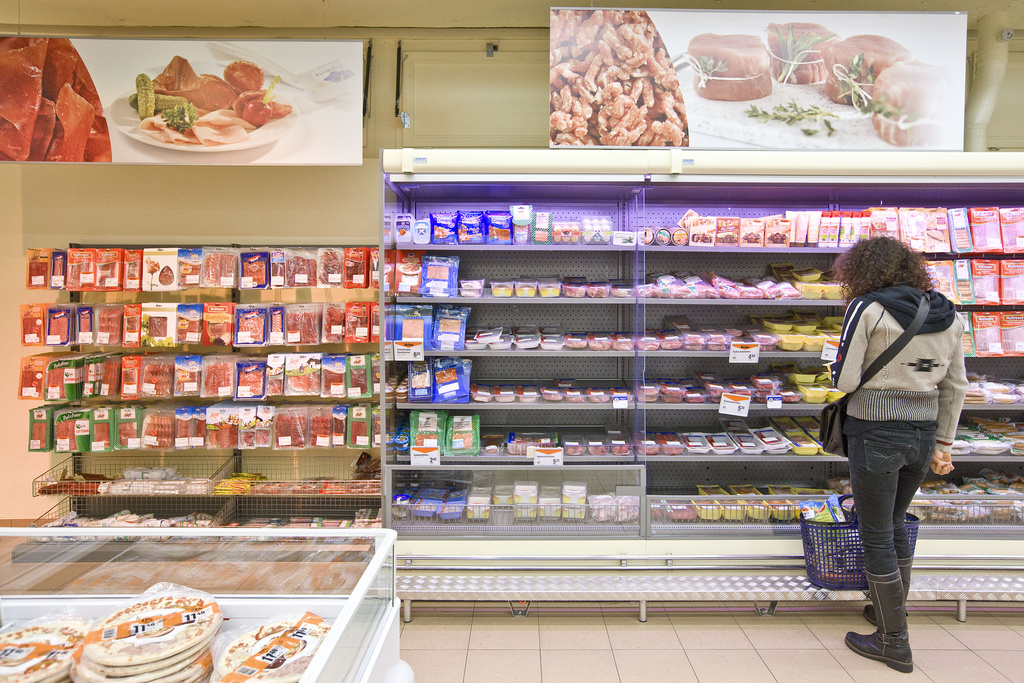Retailers weathering strong franc storm

The Swiss retail industry beat negative expectations last year to record a positive sales increase despite the strengthening franc and bleak economic conditions.
Retailers are even more optimistic about increasing turnover and profits in 2011, shrugging off the possibility that more Swiss shoppers could opt to buy goods over the border to take advantage of a weakening euro.
While a 1.7 per cent increase in turnover across the Swiss retail sector may not seem very large, Credit Suisse was convinced at this time last year that it would fall by 0.5 per cent as immigration slowed down and unemployment rose.
The side effects of these phenomena were not as severe as expected. Stripping out an estimated one per cent decline in prices across the sector, turnover rose by close to three per cent last year.
Zurich Cantonal bank retail analyst Marco Strittmatter declared the growth rate was “decent but not great”, adding that Swiss retailers should be thankful for the large numbers of immigrants in recent years that have boosted the consumer base.
“One of the main drivers has been the growing population,” he told swissinfo.ch. “People have not been buying more, but more people have been buying something.”
Price outlook
Credit Suisse struck a more optimistic note for this year as it released its annual Retail Outlook survey along with market analysts Fuhrer & Hotz on Wednesday.
The latest report forecasts a 1.5 per cent turnover growth in 2011, slightly less optimistic than the two per cent boost the industry expects. Global economic conditions are expected to fade this year compared with last as the effects of government stimulus packages wear off.
Credit Suisse expects prices to fall further in 2011 thanks to the effects of the partial lifting of trade barriers, increased competition from German supermarket chains Aldi and Lidl and the strong franc making imports cheaper.
Supermarket giant Coop said this month that prices for its goods had fallen by 1.8 per cent in 2010. But shoppers are not expected to enjoy quite the same benefits next year as the price of raw materials across the board – from oil to wheat and cotton – are tipped to escalate.
“We predict a slightly negative price trend in 2011, but not as negative as last year because commodity prices are rising,” Credit Suisse economist Nicole Brändle told swissinfo.ch.
Cost cutting
The increasing cost of commodities might help boost retail turnover this year – at the expense of consumers. But profits in some sectors, most notably groceries – are likely to face the same squeeze as in previous years.
However, nearly half of the 206 firms surveyed believed they could improve profits this year and another 39 per cent said they would remain unchanged.
“The overwhelming reason given for this confidence is that companies have effectively reduced costs and claim they are more efficient,” said Martin Hotz from Fuhrer & Hotz.
Coop, for example, has saved SFr100 million ($103 million) per year in costs since 2006 by forming a buying alliance with other European supermarket chains and improving its information technology. Coop is poised to take over European wholesaler group Transgourmet.
Switzerland has made some recent efforts to lift trade restrictions by embracing parallel imports in 2009 and the European Union’s Cassis de Dijon trading principle last year.
But Brändle believes that more must be done to cast off Switzerland’s well earned reputation as a high price island where the cost of many goods is still some 30 per cent higher than in the EU.
“These measures have had some effect, but further measures would be necessary to make a significant difference to prices in Switzerland,” she told swissinfo.ch. “For example, the Cassis de Dijon rule was only partially adopted in Switzerland. Moreover, its effect is likely to be blunted by special rules for the food sector.”
Consumer tourism
The result of continued high prices in Switzerland compared with neighbouring countries, exacerbated by the strength of the franc against the euro, is encouraging more people to buy goods in Germany, France and Italy where they are less expensive.
Last year, the Swiss Customs Office reported a ten per cent increase in the number of people claiming back tax on goods bought over the border.
The practice is hardly new, and the increase will probably not have a drastic effect on the Swiss retail sector, according to Marco Strittmatter.
“It’s becoming a bigger issue, but it only really affects people living close to the border,” he told swissinfo.ch. “People living in Lucerne or Zurich have to take into account the cost of getting there.”
The phenomenon has had an effect on the distribution of shops in Switzerland, according to Credit Suisse research. Border areas have fewer stores per head of population than in other areas, with tourist regions most densely served by the retail sector.
Basel has 8.6 shops per 1,000 inhabitants, Lugano 10.6 and Geneva 11.1. But St Moritz, with 25.4 shops per 1,000 population, is typical of the trend for shops to spring up in places where foreign guests like to visit.
Credit Suisse and Fuhrer & Hotz interviewed 206 decision makers in the Swiss retail trade.
Some 34% said they had exceeded turnover expectations in 2010 (30% were under budget), while 34% again said profit margins were better than expected (22% worse).
The most successful sectors (turnover) for 2010 were watches/jewellery (+8%) and electronics (+5%). Furniture and food enjoyed a solid if unspectacular 2% growth in sales.
For this year, 56% of retailers expect even better profit results than in 2010 (4% negative). Some 44% of respondents said profits are likely to be higher (6% less).
Retailers are planning to put their confidence into action – more than half want to increase retail space compared with 34% a year ago.
The number of retail stores in Switzerland fell by 6,300 – or 11.4% – between 1998 and 2008 as smaller shops were forced to close down. Employment in the sector, however, has continued to rise as more supermarket malls have been built.

In compliance with the JTI standards
More: SWI swissinfo.ch certified by the Journalism Trust Initiative













You can find an overview of ongoing debates with our journalists here . Please join us!
If you want to start a conversation about a topic raised in this article or want to report factual errors, email us at english@swissinfo.ch.